It often gets difficult to Survive loneliness. It grips you like a never-ending ailment, you try to get rid of it but it irks you more and leads you to the dark!
Loneliness can be compared to a thick winter’s fog.
It stifles and strangles you, pulling you under a heavy blanket of depression, pervading all that you see.
Loneliness causes you to filter life through a lens of desolation and deep despair. Your spirit becomes so heavy with the weight of your isolation that you often feel like laying down and dying.
I know. I’ve been there many times.
Whether you feel loneliness in a crowd, in your marriage, in your workplace, friend circle, religion, culture, or simply by yourself, there is hope. Yes, it’s possible to learn how to deal with loneliness, and I’ll show you how (from painful personal experience). But first:
Loneliness: You’re Not Alone
As humans, it’s our tendency to believe that we’re the only one in the world feeling the deep level of isolation we’re experiencing. But what we fail to realize that loneliness is a worldwide epidemic. And no, you’re NOT alone – at least in experiencing it.
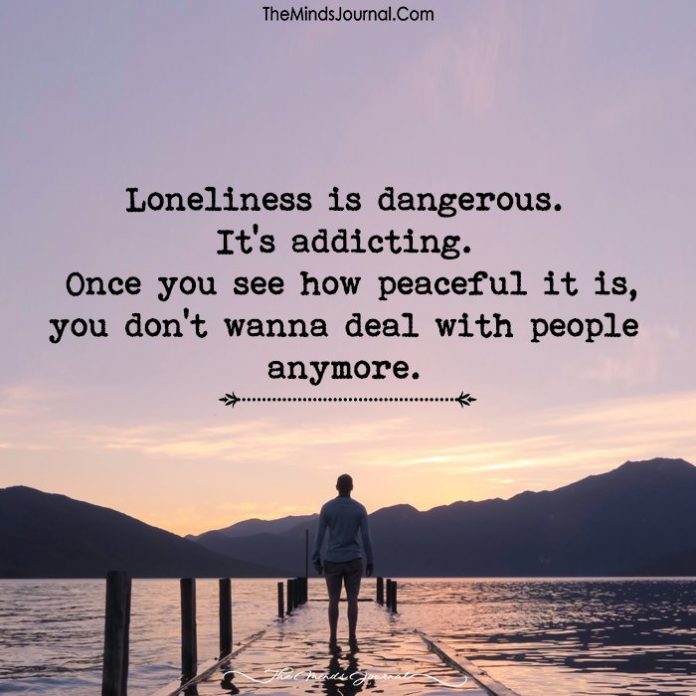
Here are some shocking findings from numerous studies/sources which will help you to see how common this issue is:
- Loneliness affects close to 47% of Americans (source)
- In Japan, there are more than half a million people under the age of 40 who haven’t left their house or interacted with anyone for at least six months (source)
- One in four Australians feel lonely at least once every single week (source) and one in five Australians rarely or never have anyone to talk to when they need help (source)
- 30% of Millenials said they always or often feel lonely compared to 20% with Generation X and 15% of Boomers (source)
- 9 million people in the UK across all ages are either always or often lonely (source)
- More than 60% of married people struggle with loneliness (source)
- 49% of older people in the UK say that television or pets are their main form of company (source)
… and the statistics keep coming and coming – this list is only the tip of the iceberg!
Can you see how widespread loneliness is and that you’re not alone as you think you are?
Read Loneliness In Children: This Is What You Can Do As A Parent
Why Are We Lonely?
While loneliness might be universally felt, the reasons why we feel it are unique for each person.
For example, I’ve felt lonely for many years due to the trauma of being brought up in a fundamentalist Christian religion. (Naturally, being taught that outsiders were “evil” caused me to distance myself from everyone which caused this deep-seated loneliness. Thankfully, I’ve since left religion.)
Other reasons why we can feel lonely often include:
- Death of a spouse
- Estrangement from family members
- Lacking access to quality relationships where we can share our deepest thoughts, feelings, and beliefs (this can be due to numerous reasons, such as working too much, living in a community that doesn’t meet your needs, struggling to connect to likeminded people, etc.)
- Undergoing a life crisis or existential crisis
- Living alone unwillingly
- Possessing different values or beliefs from the vast majority of those around you
- Undergoing a spiritual awakening process
- Poor or underdeveloped social skills
- Mental health issues such as anxiety and depression
- Childhood trauma and later-life trauma (this also includes being in toxic relationships, struggling with narcissistic family members, physical/emotional/mental abuse, etc.)
- Health issues
But perhaps the biggest reason why we struggle with loneliness is because we lack a deep connection with our inner self, our soul. This is known as soul loss.
Loneliness is very subjective. For example, someone living alone with no friends might seem lonely to an onlooker, but on the inside, they might be perfectly content and relaxed. On the other hand, a person with a big family and successful career might seem happy to the general public – but inside, they might feel totally and utterly alone.
There really is no one ironclad stereotype when it comes to loneliness.
How to Deal With Loneliness
If you’re suffering from chronic loneliness – which is an epidemic that’s increasing in our society according to numerous studies – please know that it is possible to transform this experience. And you don’t even have to put in too much effort in most circumstances.
As someone who has had a lot of experience with loneliness (I’ve spent a large portion of my life lonely and isolated), I’ve compiled a list that I hope will help you below:
1. Learn to have fun by yourself again
This was perhaps the most important method I used to overcome my loneliness.
When we lose friends or family members, or simply drift away from everyone around us, we tend to lose all sense of fun and playfulness, preferring to wallow in our misery instead.
Realize that you can have fun alone and that you don’t need to rely on others to make you happy.
The person who can enjoy life alone can never have happiness taken away from them – to truly understand this is liberating!
I started by sticking flyers about diarrhea all over the walls and mirrors of a woman’s bathroom. I never knew fecal matter could be so freeing! Start by doing something small that you enjoy. If you used to like being wacky, be wacky. If you used to like being reckless, be reckless. Take small steps first.
Regain what you have lost, by yourself. You will be a stronger and better person that way. Why? Because you won’t rely on, or use, other people for your entertainment.
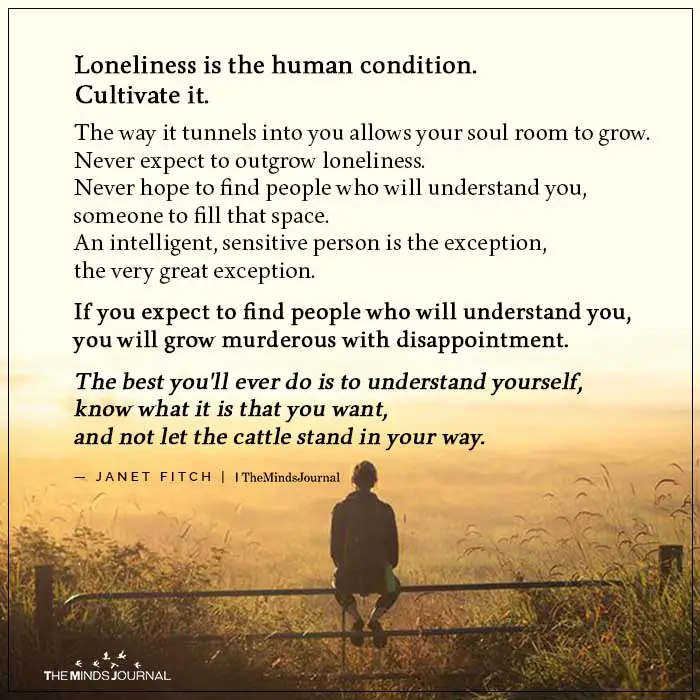
Read Spiritual Loneliness: What To Do When No One Understands You
2. Learn to laugh again
Laughing has been scientifically proven to benefit your health. But what happens when you’re lonely? Well, chances are, you don’t laugh much. At all. (I know that I didn’t.)
When you really think about it, it’s unfortunate how much we rely on others to make us happy. That’s why learning how to laugh again, by yourself is so important. It empowers you, and once again, it allows you to not use other people for your entertainment. They’re not vending machines after all!
If you find it hard to laugh at yourself, try putting on a funny film. Not only does it take your focus away from yourself and your misery, but it reboots those endorphins in your brain again. Funny pictures can also help, like those found on reddit.
Read Loneliness Adds Beauty To Life
3.Practice mirror work
Spend quality time with yourself, just like with a friend or someone you love. One powerful way of doing this is by practicing something called mirror work. Mirror work is simple, and all it requires is a mirror, openness, and some free time.
To practice mirror work for the purpose of connecting deeply with yourself, spend five minutes a day gazing gently at yourself in a mirror. I understand how bizarre that might sound, but staring deeply into your eyes and smiling every day really makes you feel happy. But don’t believe me – try it out for yourself!
One result of this strange practice is an increase in self-love and self-acceptance – especially when you pair this practice with loving affirmations such as “I accept you,” “I forgive you,” “I love you,” etc.
Every day we tend to look at ourselves in the mirror to pamper and preen, but we only do it superficially. But have you ever stopped to stare at yourself – earnestly? Try it, and you may be blown away by how much self-awareness you can develop.
4. Become your own best friend
I’m sure you’ve had a best friend in the past that now, for one reason or another, has drifted away. How did they treat you? Most people would say something along the lines of “nicely”, “considerately”, or “kindly”.
Is that the way you treat yourself? If not, why? Why can’t you be your own best friend? What is it about yourself that you’re so insecure or hateful about? Don’t you deserve love and respect just like everyone else? Exactly.
But many people falsely believe that a best friend can only be someone else. This is an absurd idea, because how can you learn to love and appreciate people truly if first you don’t love and appreciate yourself?
Treat yourself kindly. Compliment yourself. Be considerate towards yourself, and show respect. This is the foundation of self-love.
5. Become your own counselor
This is extremely important if you want to learn how to survive loneliness.
One of the most irritating things in the world to me is listening to people who moan and complain about their problems but don’t stop to question why they’re happening, or what they can do to solve them. For god’s sake, you have a brain, so use it! It’s natural for us to complain – it can be therapeutic – but constant whinging is a mental disorder that needs to be diagnosed.
Becoming your own counselor is invaluable because it allows you to explore your problems, rather than wallowing in them.
Think: why are you lonely? When did it start?
How are you feeling? Why are you feeling that way?
What can you do to solve your loneliness? By the way, kudos for checking out this article, because in a sense, you’re being your own counselor now.
Analyzing your problems really does help put them into new perspectives. When I experienced loneliness I read self-help books, wrote in journals, and mapped out my issues on pieces of paper to give them a visual perspective. The more I analyzed them and looked at them with different perspectives, the easier I found it to address my inner turmoil.
Read 5 Truths About Loneliness And How To Deal With It
6. Be near people
By nature, we’re social beings – it’s hardwired into us to crave the physical, emotional, and psychological company of fellow human beings, hence the existence of loneliness. So go out and be near people.
If going out with your so-called “friends” alienates and depresses you like it did with me, go and sit anonymously in a public space. This way you can entertain yourself by people watching, and be in close proximity to other people. Although this doesn’t necessarily cater to your emotional and psychological needs, it’s a start and was something I found useful in my loneliness.
7. Volunteer
Volunteer or join an interest group. Take small steps to get out of your comfort zone. Check your local newspaper, sign up to a Facebook group in your area, or go on meetup.com.
There are many beautiful, kindred souls to be found in volunteering circles and interest groups. In fact, if you’re looking for a friend, this is the perfect way to meet new people. Loneliness tricks you into thinking that everyone is alike and that you won’t ever be able to find a kindred soul. But by doing the math, it’s easy to see that we’ll most likely find someone to truly connect with eventually.
Read Why You Should Never Let Your Loneliness Drive You Back To Your Toxic Ex
8. Take care of yourself, physically
Neglecting yourself when you feel down is tempting. Of what consequence are you when the whole world is dark, dreary, and crumbling into a void of emptiness? None. But taking care of your body is the beginning of recovery. So be playful. Lighten up. Your body deserves comfort, grooming, and pleasure.
Have a bubble bath. Lie on a soft pillow. Buy yourself a nice treat. Get a massage. Do your hair. Drink some tea or fine wine. The more I respected my body, the more I found respect for myself in honoring my comfort and taking care of my needs.
9. Listen to calming music
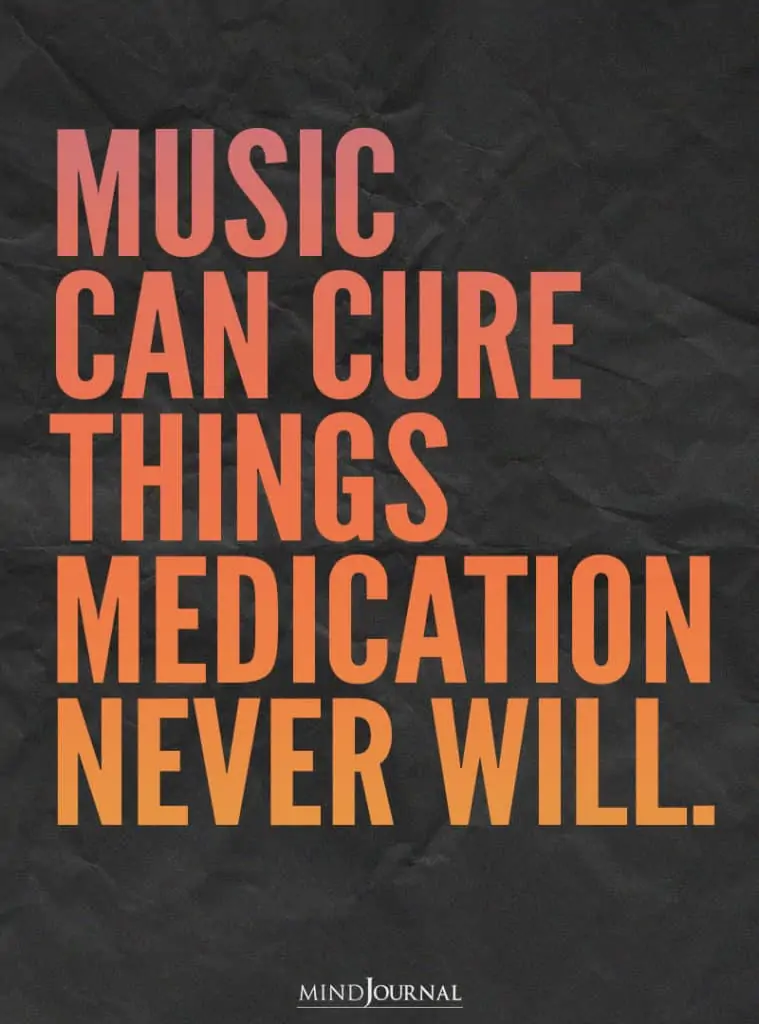
Don’t make the mistake of listening to depressing or dark music to match your mood. While dark music can provide a nice emotional release, often it just winds up making you feel even worse.
Instead, try listening to up-beat, classical, or ambient music (this will increase the endorphins, or happy chemical, in your brain).
If you want some keyword suggestions, get YouTube up on your browser and search for “happy relaxing music,” “ambient music,” “binaural beats positive energy,” “emotional healing music,” and so on. I particularly love listening to wind chimes and hang drums: they’re light, ethereal, and uplifting.
Read The Healing Power of Music: How Music Therapy Improves Mental Health
10. Learn to love joy more than misery
It’s quite possible that you’re in love with your misery at this very moment in time. I know this sounds bizarre and a little shocking, but see this article which explains this concept more in-depth.
Speaking from personal experience, I realized at some point that I was accustoming myself too much to a miserable way of life. After a while, when all we know is isolation and depression, we tend to grow accustomed to this way of living. It becomes the norm. And in a sickly way, it even provides us with a sense of comfort.
This means that when we try to break our “norm” of isolation and depression we become uncomfortable, suddenly thrown out of our comfort zone. This fear can lead to self-sabotaging behavior that is designed to try and regain that sense of comfortable (yet stagnant and miserable) safety. Becoming aware of this can truly liberate you when learning how to deal with loneliness.
11. Understand that it’s possible to be alone, but not lonely
It’s a simple mindset shift, but it makes a world of difference. Sometimes the loneliness we feel is a byproduct of what society tells us. After all, we are all sold the idea that being in a heterosexual relationship with 2-3 children and a job is meant to be the pinnacle of normality and non-loneliness.
But is it?
Why should we believe and adopt this idea and let it affect OUR happiness?
Just because we find ourselves alone, divorced, widowed, friendless, what-have-you, doesn’t mean we’ve failed. Nothing in life is permanent, even the position you find yourself in now. So then, why should we allow ourselves to be pressured to feel like there’s something “wrong” with us when everything is temporary.
It is absolutely possible to be alone but not lonely. In fact, some of the most isolated people in the world have also been the most successful and/or happy (think of spiritual ascetics, monks, saints, writers like Emily Dickinson, innovators like Einstein, and artists like Greta Garbo who famously stated “I want to be alone”).
We explore the benefits of solitude more in our book The Power of Solitude.
12. Find an animal companion

If you can’t, don’t want to, or don’t have the time to connect with other people at this point in life, an animal companion is a wonderful way to feel emotionally connected to another living being.
Adopting a dog, cat, rabbit, bird (or whatever you resonate with) from a local shelter is not only an act of compassion, but it ensures that you’ll have another living being to spend your days with.
Not only that, but often animals have a way of reconnecting us back to other humans. Dogs, for example, are a beautiful way of forming connections, even fleeting ones, with other dog owners at the park.
Read Is It Solitude or Loneliness?: 4 Questions to Help You Tell
13. Reconnect with your soul
Right at the heart and core of loneliness is often a disconnection from our innermost Self.
In other words, loneliness is often not a lack of company, it’s a lack of quality connection with your deepest self.
When we are disconnected from our Soul we struggle with lethargy, demotivation, depression, and the desire to isolate ourselves from others. This is known as soul loss, and it’s a common issue in society.
In order to reconnect with your Soul, you will need to practice inner work to remove the blocks (in the form of negative beliefs, traumas, and core wounds) that stand in the way of your inner light.
One powerful way of beginning inner work is by starting your own spiritual practice. (And yes, you can still be religious or an atheist and have a spiritual practice – it’s how you define it that matters.) Read more about spirituality to begin the next step in your journey.
I hope this article has helped to inspire you to learn how to deal with loneliness better. Please remember that no matter how isolated you feel, there is always something you can do to feel a little better. And in fact, the likelihood is that someone living in the very same suburb as you right now is feeling something similar. You’re not as alone as you think.
What has your experience been like with social isolation?
I’d love to hear below!
Written by ALETHEIA LUNA Originally appeared on LONERWOLF Republished with permission
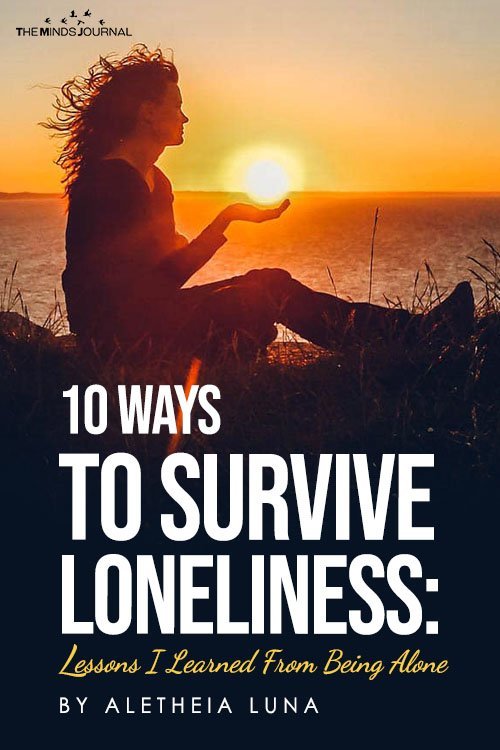
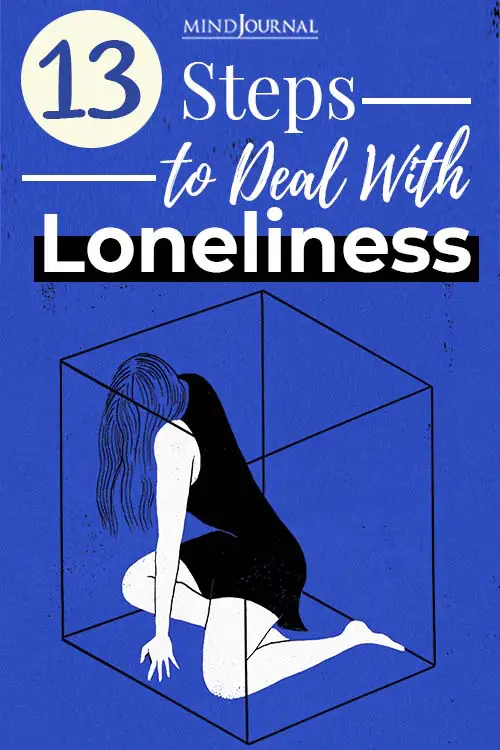
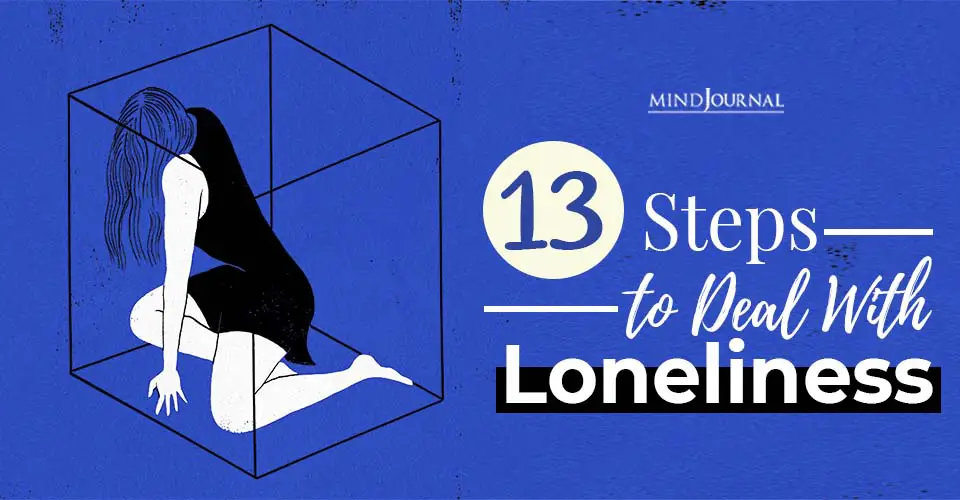







Leave a Reply
You must be logged in to post a comment.